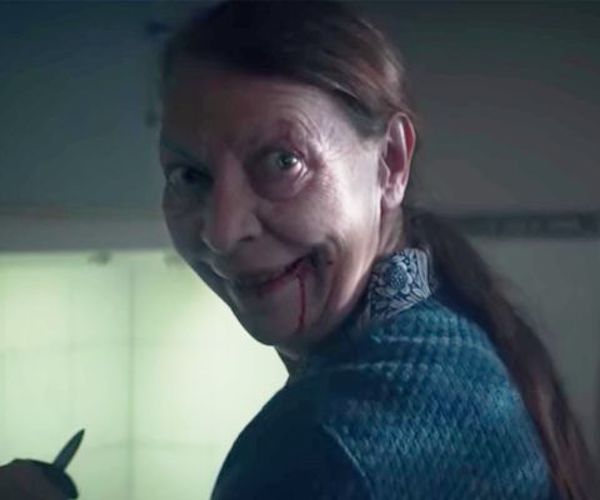WATCH CLOSELY: “Marianne” — Pure, Artful Evil
By Peg Aloi
Marianne is one of the slickest horror series I’ve seen on Netflix.

A scene from Netflix’s “Marianne.”
This French horror series from Netflix is a juicy, clever, and very gory delight. The story begins with a celebrated horror novelist’s reading before a small audience in a bookstore in Paris. Emma Larsimon (the excellent Victoire du Bois) created the character of Lizzie Larck, a sort of demon-hunting detective whose nemesis is a medieval witch named Marianne. Her books are popular and have earned her millions — and she is only in her late 20s. As the reading ends, a fan asks a question: is she really going to retire the Lizzie Larck character and work on something else? She confirms this as fans chatter and sigh in disappointment.
We see that Emma is a bit of a narcissist, self-centered, a bit toxic. She makes her agent Camile (Lucie Boujenah) travel with her on book tours. Camile soon begins to resent Emma’s manipulative behavior. Then a childhood friend of Emma kills herself in a very public place, saying that she was driven to do it by Marianne, who wants Emma to keep writing. At first the author assumes this is a horrible but isolated event. But Emma is disturbed enough to drop everything and demand her agent accompany to her hometown, a coastal village called Elden.
As a setting, Elden is cinematic in the extreme. There’s a lighthouse next to a shuttered Catholic school, which is separated from the mainland at high tide. The village boasts charming provincial homes and country mansions (like the one Emma grew up in), but there is also a slightly urban element, evident in glimpses of rebellious graffiti. When Emma arrives at her parents’ home, a place she hasn’t been in over a decade, she walks in on them during an intimate moment (played for both scares and laughs, because at first we don’t know what is going on). Despite Emma’s embarrassment, we see that her casual attitude about sexuality is influenced by her parents’ earthy sensuality. There’s a reference to a newspaper editorial Emma wrote as a teenager that publicly humiliated her mother, but generally her parents are happy to see her, even if they’re perplexed about her reasons for visiting.
Emma hooks up with her old pals, including Aurore, a friend whose younger sister died in a tragic accident, and Emma’s two old flames, Seby and Tonio. They all get drunk together, reminiscing and generally agreeing life in Elden is rather awful, despite its beautiful landscape. Supernatural stuff starts happening, subtle and infrequent at first, but then there is another grisly murder attributed to Marianne, and soon enough, Raunan (Alban Lenoir), an unorthodox police officer and amateur occultist is on the case. He is trying to figure out why an elderly woman in the neighborhood, Madame Daugeron (played by the wonderful character actress Mireille Herbstmeyer) seems to be possessed by the witch Marianne — and is forced to do her bidding. Marianne keeps urging Emma to continue writing about her (shades of Stephen King’s Misery here, which deals with a crazed fan who can’t accept a fictional character’s demise). Marianne, speaking through Madame Daugeron, threatens to kill everyone Emma loves if she refuses.
As the conflict ratchets up, the proceedings become bloody, violent, and terrifying. I’m a horror aficionado, but I sometimes found I didn’t want to watch this one right before bed; the gore was that disturbing. But what keeps Marianne from being merely another scary exercise in horror is the underlying story of Emma’s troubled youth, the secrets she has kept for years, and the disturbing events that forced her to leave home and fend for herself at a tender age. Emma thinks she can exorcise her demons by creating a fictional character to vanquish Marianne but she eventually realizes no one can do battle with this destructive witch but her creator, who is, in a sense, doing battle with herself. At its heart, this glossy horror series is a profoundly moving exploration of the artistic process and how it informs personality and life choices.
Co-written by Samuel Bodin and Quoc Dang Tran, and directed by Bodin, this is one of the slickest horror series I’ve seen on Netflix. Despite being brutal to watch at times, Marianne is gorgeously atmospheric, boasting stunning cinematography by Philip Lozano and a brilliant score by Thomas Cappeau (both of whom previously worked with the co-writers on the comedy series set during WWII, Lazy Company). The cast is excellent, and I was excited to see that the first season (eight episodes, most of them slightly under 40 minutes) ends on a gem of a plot point that suggests the story will continue.
Peg Aloi is a former film critic for The Boston Phoenix and member of the Boston Society of Film Critics. She taught film studies in Boston for over a decade. She writes on film, TV, and culture for web publications like Vice, Polygon, Bustle, Mic, The Orlando Weekly, Crooked Marquee, and Bloody Disgusting. Her blog “The Witching Hour” can be found at themediawitch.com.

